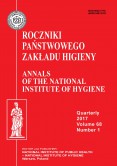Rocz Panstw Zakl Hig 2015, 66(3): 269-274
Hormonal contraceptives and hormone replacement therapy as a possible factor of breast cancer.
[Hormonal contraceptives and hormone replacement therapy as a possible factor of breast cancer.]
ABSTRACT
Background. Breast cancer is a disease with an increasing incidence, and it originates from several factors. Risk factors of this disease represent a diverse group of parameters, which also include hormonal influences.
Objective. The aim of the present study was to determine if there is a relationship between hormonal contraceptives and hormone replacement therapy in patients with diagnosed most common types of breast cancer taking into account the age at which the disease was diagnosed in selected sonographic clinic in the district of Nitra, Slovak Republic.
Material and Methods. As a part of an ongoing retrospective study from 2005, a cohort of 300 randomly selected patients aged 25-87 years with diagnosed breast cancer have been monitored in 2012. The age at which breast cancer was diagnosed, and relationship to hormone therapy were analysed based on medical documentation.
Results. Among 300 randomly selected patients with a confirmed diagnosis of breast cancer the group at the age of 40-59 was the most numerous (mean age was 53.06±11.25 years). The mean age of 45 patients who were given hormonal contraceptives (HC) was 46.44±7.34 years, whereas the mean age of 82 patients who were subjected to hormone replacement therapy (HRT) was 53.63±6.67 years. In women who took hormonal treatment, breast cancer was diagnosed at the mean age of 50.60±7.56 years, while women who never took HRT or HC, were diagnosed around the age of 53.92±12.35 years. The most common types of cancer were the infiltrating ductal carcinoma and lobular carcinoma. From all patients, the relapse occurred among 14 of them, about 4.86 years later. Only 2 patients had breast cancer on both diagnosed breast. After a surgery, the cancer was observed in 7 patients. The positive family history was confirmed with 34 patients.
Conclusions. Nowadays, the breast cancer treatment, especially at early stages, is successful, however, the malignant breast neoplasm remains the most common oncological disease causing the death amongst women. In the assessment of the impact of HC and HRT on breast cancer, it is not possible to provide a clear conclusion, because their influence on the tumour is difficult to verify.
STRESZCZENIE
Wprowadzenie. Rak piersi jest chorobą, której występowanie uzależnione jest od wielu czynników. Czynniki te są zróżnicowane, a wśród nich wyróżnia się czynniki hormonalne.
Cel. Na podstawie danych medycznych podjęto próbę oceny występowania zależności różnych typów raka piersi u kobiet a stosowaniem antykoncepcji hormonalnej oraz hormonalnej terapii zastępczej.
Materiał i metody. Praca stanowi część trwającego od 2005 roku badania stanu zdrowia pacjentek w wieku 25-87 lat. Badaniami objęto kohortę 300 kobiet, u których w 2012 roku zdiagnozowano raka piersi. W badaniach przeprowadzonych na podstawie analizy dokumentacji medycznej oceniano zależność między wiekiem kobiety, w którym zdiagnozowano raka piersi a terapią hormonalną.
Wyniki. W grupie 300 kobiet ze zdiagnozowanym rakiem piersi, najliczniejszy udział stanowiły kobiety w wieku 40-59 lat (średnia 53.06±11.25 lat). Wśród pacjentek wyróżniono 45 kobiet stosujące HC (HC – antykoncepcje hormonalną) ze średnim wiekiem 46.44±7.34 lat oraz 82 kobiety stosujące HRT (HRT – hormonalną terapię zastępczą) ze średnim wiekiem w tej grupie 53.63±6.67 lat. Wśród kobiet, które przyjmowały preparaty hormonalne średni wiek wykrycia raka piersi wynosił 50.60±7.56 lat, w porównaniu do kobiet nie stosujących żadnej terapii hormonalnej 53.92±12.35 lat. Wśród badanych kobiet najczęściej stwierdzany był naciekający nowotwór wewnątrzprzewodowy (ductal carcinoma) oraz wewnątrzzrazikowy (lobular carcinoma). U 2 pacjentek stwierdzono dwa rodzaje nowotworu. Wśród 14 pacjentek wykryto nawrót choroby, średni czas od powtórnego zdiagnozowania nowotworu wynosił 4.86 lat. Po operacji chirurgicznej nowotwór wykazano u 7 kobiet. W grupie 34 pacjentek stwierdzono występowanie nowotworu piersi w rodzinie.
Wnioski. W obecnych czasach leczenie nowotworu piersi, szczególnie we wczesnych stadiach choroby przynosi satysfakcjonujące rezultaty. Jednak złośliwe postacie nowotworu nadal są przyczyną wysokiej śmiertelności wśród kobiet. W niniejszym badaniu nie udało się wskazać istotnej zależność pomiędzy występowaniem nowotworu piersi a stosowaniem HC i HRT wśród badanych kobiet.
Liczba pobrań: 2913


